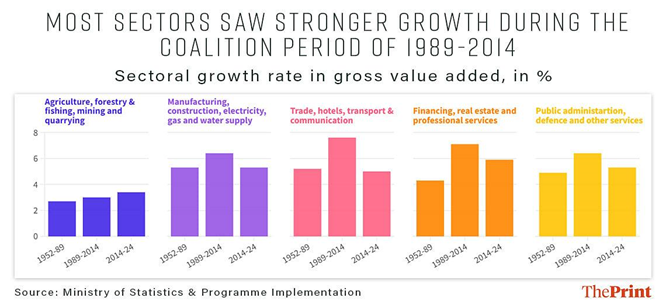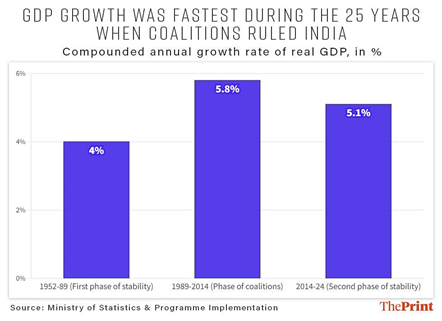DO COALITION GOVERNMENTS SLOW DOWN THE ECONOMIC REFORMS AGENDA?
Relevance: GS 2 – Parliament and State legislatures—structure, functioning, conduct of business, powers & privileges and issues arising out of these.
Why in the News?
- Until the 2014 Lok Sabha elections, India had coalition governments for 21 years. As of 2024, the BJP holds 240 seats in the Lok Sabha. India currently has a coalition government.
- Fitch Ratings noted that coalition politics and a weakened mandate for the National Democratic Alliance (NDA) might hinder the passage of ambitious reforms.
- Chief Economic Advisor V Anantha Nageswaran’s View: He believes coalition dynamics facilitate incremental reforms.Dialogue is enhanced, making difficult reforms more feasible over time.
Policy Concessions in different Governments
- Economic growth is influenced by many factors, not just government form.
- Single-party rule is not the only option, and coalitions can function effectively.
- Reforms can happen under coalitions, as seen in India’s economic liberalization in 1991.
- Both single-party and coalition governments involve compromise and bargaining.
- Coalitions can lead to “weak reform” but also more policy stability for long-term investment.
- As Montek Singh Ahluwalia once said, “There is a strong consensus for weak reform”.
- Social policy reforms might face delays due to coalition negotiations.
- Coalitions make these compromises more transparent.
- India’s experience with coalitions has been positive, with checks and balances leading to better governance. Whereas Single-party rule can lack checks and balances, potentially leading to bad decisions.
Coalition Governments
- Continuity in Policies: Coalition governments haven’t drastically changed economic policies since 1991. Reforms are gradual and incremental.
- Public Bargaining: Different viewpoints are considered and accommodated through public bargaining between parties.
- Institutionalized Decision-Making: Coalition governments develop mechanisms like committees and “Group of Ministers” for inclusive decision-making.
- The V.P. Singh’s government had 6 committees which evolved in the Atal Bihari Vajpayee government to examine the most pressing issues.
- Better for Reforms: Coalitions encourage dialogue and may prevent unilateral decisions like the recent farm laws.
- Stronger Centre-State Relations: Regional parties in coalitions activate institutions for better Centre-State communication.
- More Informed Policy-Making: The process might be turbulent, but it considers diverse perspectives.
Challenges of Coalition Governments:
- Acrimonious Dialogue: Disagreements between coalition partners can lead to tense discussions.
- Stalled Reforms: Ideological differences can stall reforms, as seen with the Janata Party government.
- Not All Single-Party Governments are Efficient: Even single-party majorities can struggle with internal disagreements
- Despite having the largest seat majority in the history of independent India, Rajiv Gandhi’s government faced stalled liberalization reforms due to internal party checks within the Congress.
- Fiscal Issues: Balancing demands can lead to higher deficits, as with the Janata Party.
- Focus on Outcome vs. Process: Critics might only judge final policies and miss the benefit of a more inclusive decision-making process.
State Share in Divisible Tax Pool under Coalition Government:
- Planning Commission Abolished: Planning Commission provided negotiation space for states, but the replacement, Niti Aayog, is less state-friendly.
- States’ Role: The role of states is supposed to be bigger in coalitions, but this hasn’t translated to a larger share of taxes.
- Centralized Decision-Making: Power is concentrated in the Prime Minister’s Office, reducing state influence.
- Focus on Central Benefits: Central government takes credit for social programs, downplaying state contributions.
- Complex Issues: Determining state share involves economic performance, regional disparity, and vertical imbalance between center and states.
- GST Discontent: States feel shortchanged by the GST tax system, which reduced their revenue compared to the pre-GST regime.
NDA Government and its Vision
- The NDA is just beginning its term.
- Uncertainty remains about whether the decision-making and governance style of the last 10 years will change substantially.
- Economic Vision Among Allies
- Allies within the NDA may or may not share a similar economic vision.
- The BJP needs its allies for a majority, but retains control of all important ministries.
- Andhra Pradesh Chief Minister Naidu was an early liberalizer.
- There is a general consensus on economic reforms across parties.
- Power Distribution and Decision-Making Style
- Differences lie in power distribution and the style of decision-making.
- No major conflict in economic policies among allies.
- Potential differences could arise in the pace of decision-making.
- The mechanisms and processes used for decision-making will influence whether economic reforms are stalled or advanced.
Solutions in Navigating the Coalition Challenges
- Communication and Transparency: Establish clear communication channels between coalition partners. Regularly brief each other on internal discussions and external developments.
- Shared Policy Agenda: Ensure a common minimum program outlining key policy areas where all parties agree. This provides a foundation for decision-making and minimizes public disagreements.
- Strong Leadership: The Prime Minister or coalition leader needs strong negotiation and communication skills to keep partners on board and mediate disagreements.
- Internal Dispute Resolution: Set up a formal or informal process for resolving internal conflicts. This could involve a designated committee or regular meetings of party leaders.
- Focus on Common Ground: Prioritize areas where parties have common ground and tackle divisive issues through compromise or delaying them.
- Respect for Individual Parties: Acknowledge the individual identities and priorities of coalition partners. Allow them some freedom on non-core issues to maintain their own base.
- Managing Expectations: Manage public expectations regarding the pace of decision-making, acknowledging the need for consensus building.
- Openness to Compromise: All parties must be willing to compromise on some of their goals in the interest of maintaining the coalition.
Alternative articles
- https://universalinstitutions.com/parliamentary-system/
- https://universalinstitutions.com/political-parties/
Mains question
Discuss the impact of coalition governments on economic reforms in India, considering the historical context and the challenges of decision-making and power distribution. (Answer in 250 words)





